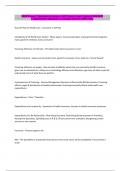IHOP Exam 2 | Questions & Answers (100 %Score) Latest Updated 2024/2025
Comprehensive Questions A+ Graded Answers | 100% Pass
How We Pay for Health Care - Insurance or Self Pay
Complexity of US Health Care System - Many payers, many private plans, many government programs,
many payment methods, many uninsured
Financing Influence on Demand - This determines who has access to care
Health Insurance - lowers out-of-pocket costs, patient's consumer more, leads to a "moral hazard"
Financing Influence on Supply - New services proliferate when they are covered by health insurance,
given rise to subindustries, influence on technology diffusion and utilization, get more of what is paid for
and provide more of what they are paid for
Consequences of Financing - Various Management Decisions Influenced By Reimbursement, Financing
affects supply & distribution of health professionals, financing eventually affects total health care
expenditures
Expenditures = Price * Quantity -
Expenditures are Increase By - Expansion of health insurance, increase in health insurance premiums
Expenditures Can Be Reduced By - Restricting Insurance, Restricting Reimbursement to Providers,
Having Few Specialists, Spending Less on R & D, Direct control over utilization, Designating certain
services as not covered
Insurance - Protects against risk
Risk - The possibility of substantial financial loss from some event, where probability of occurrence is
small
,Four Principles of Insurance - 1. Risk is Unpredictable for the Individual 2. Risk can be predicted with
some accuracy in a large group 3. Insurance pools resources to spread risk 4. Losses are shared by all
members
Underwriting - Process of using a large group to estimate total risk for an individual and spread the risk
Health Insurance - Is designed to be used, unlike homeowner's insurance, flood insurance, car insurance,
life insurance etc.
Premiums - amount charged by insurer to insure against risk, involves employer & employee cost
sharing
Cost sharing - deductibles, co-payments, coinsurance reduces moral hazard
Moral hazard - using lots of resources because you have them
Rand Cost Sharing Experiment of 1980s - Identified the concept that cost sharing reduces moral hazard
Deductibles - amount paid before insurance covers costs, applied annually
First dollar coverage plans - plans without co-pays or deductibles, very rare
Co-payments - amount paid along with insurance payment for services
Coinsurance - another insurance plan besides primary plan to cover other uncovered costs
Two Risk Assessment Methods - experience rating, community rating
Experience rating - group's medical claims experience, vary from group to group
, Community Rating - risk spread among a larger community, risks include smoking, pre-existing
conditions etc. good risks help pay for poor risks
Indemnity plan - reimburses the insured a predetermined amount per service, insured is responsible for
paying provider
Service Plan - provides services to the insured, plan pays the provider directly-except for deductibles and
co-payments
Health Insurance Coverage - only what is considered "medically necessary", vision and dental are often
separate
Group Insurance - Tax advantages when obtained through employer
Individual insurance - cost based on individual's health, this is most expensive way of obtaining
insurance
Managed Care Plans - Group plans where every member has primary care doctor, you need primary care
doctor to refer to specialists, were designed to try to control costs
Self Insurance - group insurance offered by large firms, ie. The University of Iowa, spurred by public
policy, No premium tax on employers
ERISA - Passed in 1974 exempts self insured from state insurance regulations
Self Insured Private Firms - 55% of insured employees are at these firms, if a firm has 5000+ employees
89% of them are self insured
Health Reimbursement Arrangement - Funded by the employer, employees prohibited from
contributing, HDHP is optional




